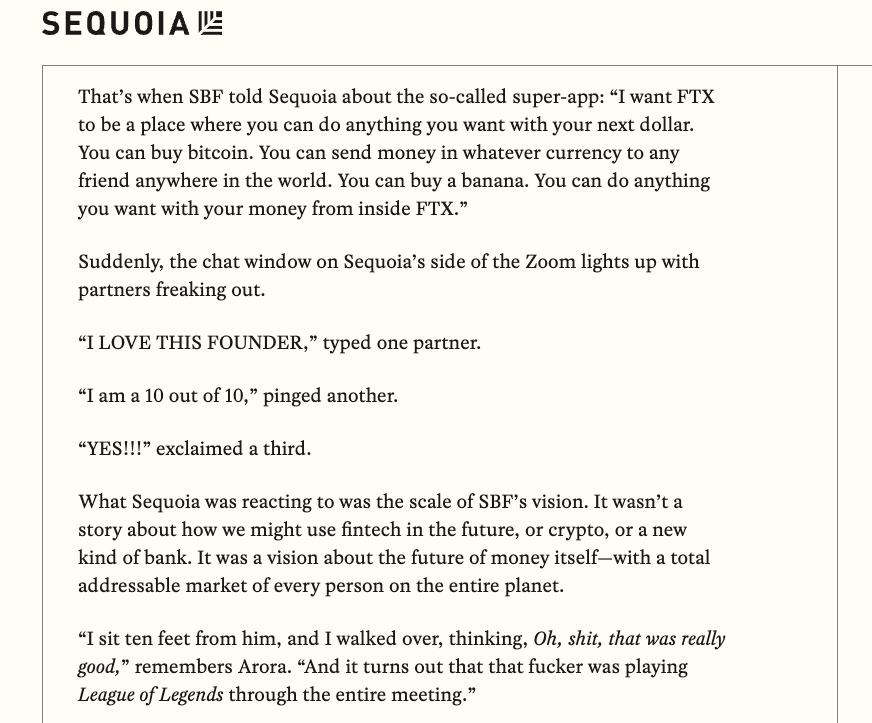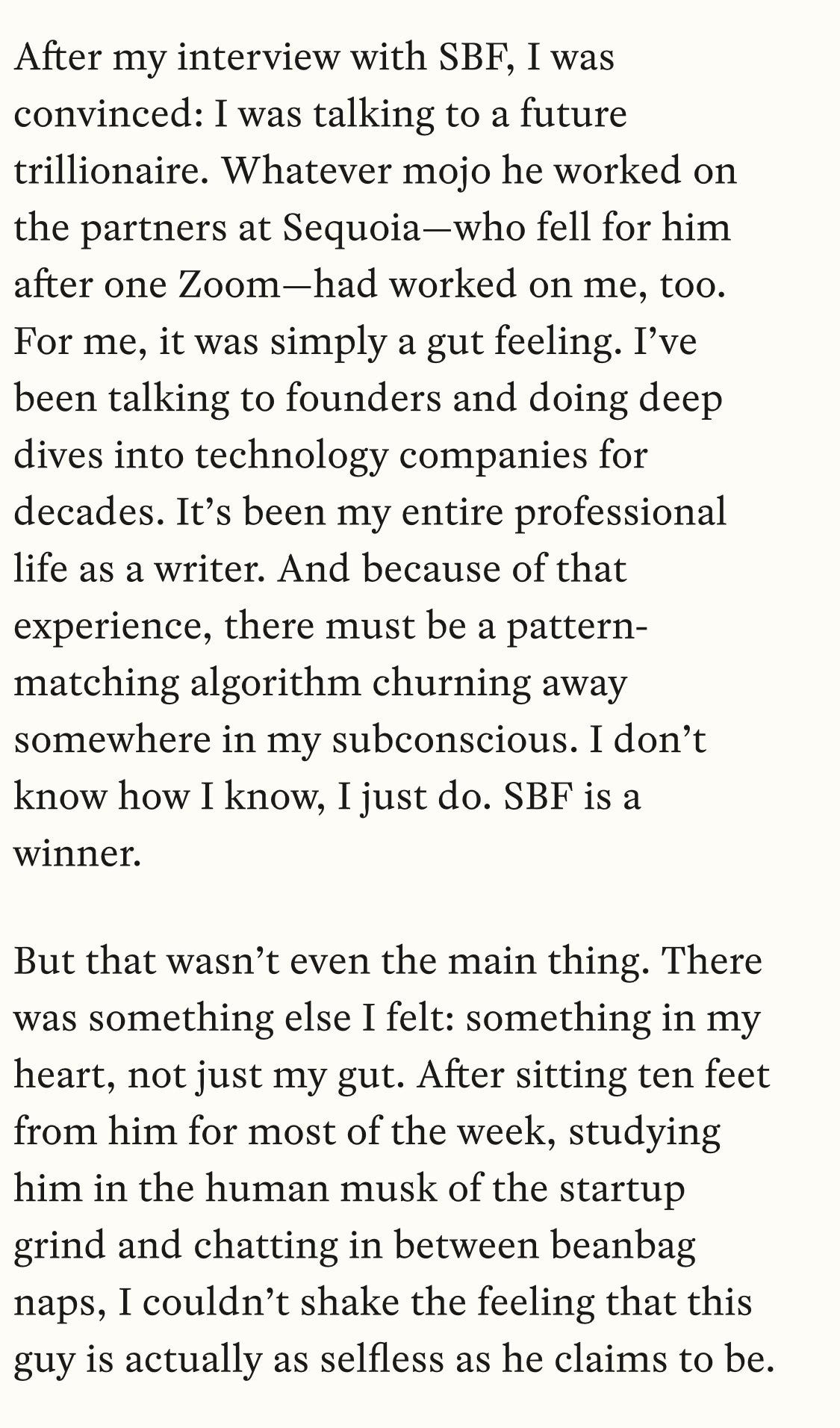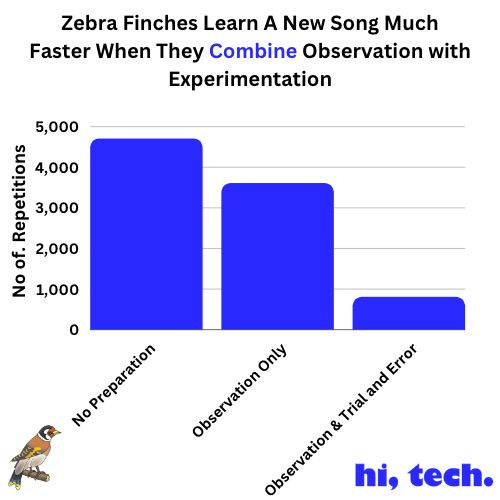Hello,
Another week, another fraud. No, I’m not talking about you - I’m talking about the FTX farrago. 😉
To keep it light, we’re also looking at five new generative AI tools, a funky story about how finches learn, and a little bit about Daniel Ek’s new venture.
The results of the hi, tech. reader survey are in! I was very pleasantly surprised by your kind words, so much so that I made my first ever word cloud with the responses:
I don’t know what I set out to achieve with this newsletter, but if I’d known people would find it both informative and entertaining I think I would have been very happy with that outcome. We pride ourselves on our picaresque earnestness round here.
However, I did also ask for ways to improve. Apart from the usual answers (make it shorter, send it less often, write about blockchain), there were useful suggestions too:
Add an audio version (the most frequent suggestion)
Do more interviews with interesting tech/business people
Start making the videos and podcasts again
Post more of the data analysis specials
These are all things I’d love to do.
So I’ll put out another shout for the opportunity to sponsor hi, tech. right here:
Failing that, we’ll take a look at some other options. There is a nice opportunity to expand on what we do already, time permitting 🤓
Revealed: Spotify founder Daniel Ek’s secret healthtech startup
This is an excellent scoop from Mimi Billing at Sifted.
Daniel Ek is serious about creating a healthtech startup and Sifted uncovered a host of juicy details in this story. We’ll be keeping an eye on this one - plenty of tech types have tried to get into health, and none has cracked it yet. The first to get it right will write the future of this gargantuan industry.
How Meta went from a trillion-dollar company to mass layoffs
“The company literally has one foot in one direction, which is the metaverse, and another foot in short form video trying to compete with TikTok, and it's not doing either particularly well at the moment,” Forrester Research Director Mike Proulx told Yahoo Finance.
Harvard Business Review has a good article on how to handle mass layoffs sensitively, too. It’s fair to say the big tech companies have not followed any of that advice.
Five lessons on how not to do pricing from Elon Musk’s Twitter
A nice summary of all the mistakes Musk made on just one small question after the Twitter takeover.
“The guy seen as the only person that could fix Twitter, now portrayed as the one that will kill it. The guy who believed Twitter was an essential tool for free speech, who now asks users to pay to use it.”
This is also worth a read from MIT this week:
Here’s how a Twitter engineer says it will break in the coming weeks
5 Generative AI tools
Generative AI has progressed so much in the last few months that it really is difficult to keep pace. I use Bleeding Edge to check in and see what has happened every week.
After the explosion of AI-generated images we saw after the public launch of DALL-E 2 and Stable Diffusion, startups are racing to build products that direct these developments towards specific business problems.
Below, check out just five that I have seen this week:
Movio is an AI video generator that can help you take your marketing text and turn it into a spokesperson video in just minutes.
Khroma uses AI to learn which colors you like and creates limitless palettes for you to discover, search, and save.
Murf AI creates voiceovers for movies and podcasts.
AIVA creates unique musical accompaniments for branded content.
Frase.io helps you research, write, and optimize high-quality content in minutes instead of hours.
The FTX fiasco creates chaos for crypto
You’ll have seen this week that the crypto exchange FTX has gone from a supposed value of $32 billion to the rather more modest value of $1. Hey, they’re still a dollar ahead of hi, tech.
FTX’s founder, Sam Bankman-Fried (who everyone apparently calls SBF), was heralded as a genius not so long ago. His name is somewhat Dickensian, isn’t it? Bankman-Fried, soon to be fried by the men at the banks that he once said were dead.
In terms of falls from grace, it’s like that time Winona Ryder got caught shoplifting.
Regular readers will know that I do not care about crypto. I’m more interested in celebrity scandals from the 90s and early 00s.
You see, the aim of this publication is to find some substance beneath the surface of the big stories in tech. When it comes to crypto, I’m like the protagonist in Shelley’s Lift Not the Painted Veil:
Through the unheeding many he did move,
A splendour among shadows, a bright blot
Upon this gloomy scene, a Spirit that strove
For truth, and like the Preacher found it not.
There’s nothing there, is what I’m saying. People will tell you there is; they’ll tell you that you just can’t see the future.
Then they’ll be arrested for fraud in the Bahamas.
Or at least, that seems to be the fate of “SBF”.
And that’s the part that does interest me: why do people want to believe in these self-mythologising characters, time after time after time?
So, what happened with FTX?
If you’ve read the above, you’ll know I’m not the hombre to stitch this one together. I did, however, find you this step-by-step summary from this excellent round-up:
Steps 8 and 9 are critical here.
FTX used customer funds to prop up another one of its businesses, Alameda. In essence, it took a gamble on the crypto market, in the expectation that they could keep the guaranteed winnings for themselves and replenish the FTX client accounts before anyone found out.
SBF was able to do so, partly because his company didn’t have a board of directors. He also created a “backdoor” in the company’s accounting system that allowed him to alter FTX’s financial records without alerting the auditors. He moved $10 billion out of FTX without anyone even noticing.
When some crypto people caught wind that something wasn’t right, they started pulling funds out of FTX. Except, FTX no longer had the funds. And the crypto market kept crashing, so its gambles never paid off. Yes, the everyday users will be the losers again.
There are now concerns of a similar run on other exchanges, like Binance and Crypto.com. Are they managed any more effectively than FTX was? In an unregulated industry, it is unlikely they are squeaky clean.
If you’re wondering how we end up in these situations, this story about SBF’s pitch to Sequoia Capital should get you up to speed pretty sharpish. It’s crazy:
“A place where you can do anything you want with your next dollar.”
What, a mall? Winona Ryder got what she wanted there and she didn’t even need a dollar.
This gushing nonsense was all written just a couple of months ago. And if you think that’s a one-off, you’re way off.
Here’s some other bro on the Sequoia blog in September 2022(!):
A charitable reading would be that these people are, by nature and by necessity, optimists. They want to see the potential in big ideas. They even want to believe that their role is to create “value” in the world, not just piles of cash.
That can make them naïve, but they have to accept a lot of defeats to get the few huge wins that make it all worthwhile.
A more honest reading would be that there is an arrogant elitism at play here. There is no need for hard evidence of a business’ potential, because these few men are possessed of rare “intuition”. Even “heart”, if you can stomach the notion.
And so, they are cheerfully taken in by a chancer who I don’t even believe set out to deceive them. It seems SBF just didn’t know what he was doing and made some criminal mistakes to cover his tracks when it all went wrong. The conman does not need to be sophisticated when he has a conference room full of willing marks.
There will be another SBF, you can mark my words. It may not even take us to the end of the year for the next one to be exposed.
And now for something a little different.
I was walking through the park the other day and I stopped to wonder: How do birds learn new songs?
As it turns out, scientists have been looking into this for some time. Often, they use zebra finches for their research because they are a sociable species.
I’ll start you off with a cool fact:
Zebra finches are able to remember up to 42 bird voices based only on their vocalisations. I’m not sure I could recognise even 4 human voices without a visual prompt.
To figure out how the finches learn new songs, eggheads ran a series of experiments.
In the tasks, the birds had to distinguish between two tunes, one longer than the other.
They were split into three groups:
1⃣ Those that had no special preparation: They had to hear the tunes 4,700 times before they mastered them.
2⃣ Those that were able to observe (via a specially made perch) more senior birds performing the tune: They took 3,600 repetitions to crack it.
3⃣ A third group, who prepared by observing and also experimenting with recreating the tune: They required 900 repetitions to learn it.
In addition:
"Birds that learned a perceptual skill through trial and error were better able to generalise and adapt that skill to new situations than those that learned it through observation."
Now, if I were presenting this research on one of my webinars, I know that I would look into the chat box about now and at least three people would have said a variation of the following:
Oi, why you talk about this? I am not a finch! Tell me what is the takeaway for B2B business!!!
Reader, I wish I were joking.
It’s the phrase “B2B business” that really gets me.
Let’s unscroll it:
Business to business business.
It’s like an alien has landed on Wall Street and it’s overcompensating as it tries to fit in with the water cooler chat.
So, my point runs thusly:
The researchers saw similarities between how finches learn and how children learn new skills. It is worth examining whether the lesson applies equally to adult human brains, which I believe it does.
49% of adults in the UK have the numerical literacy one would expect of a small child. It sounds like I’m making that up, but it’s true.
How do we learn skills at work? If we learn through trial and error, we do so on the job and at a cost. In a remote-working world, opportunities to learn through observation are reduced too.
The answer is not either/or - it is both. We need both observation and hands-on practice to master skills, so that we can adapt to new situations.
“In the trial-and-error case, they remember fewer details but focus on the most prominent aspects of the song, such as its duration."
I am certain that we have not applied this research to digital skill acquisition and retention.
🤓🤓🤓













